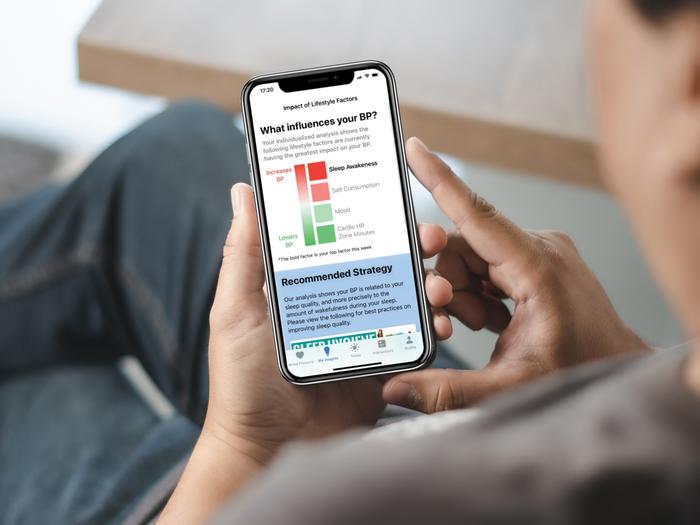(Toronto, May 28, 2024) A new study in JMIR Cardio, published by JMIR Publications, shows that a fully digital, artificial intelligence (AI)–driven lifestyle coaching program can effectively reduce blood pressure (BP) in adults with hypertension. This AI-based program leverages data from wearable activity trackers and BP monitors as well as a mobile app questionnaire to tailor lifestyle guidance. The research team, led by Jared Leitner of the University of California, San Diego, used this innovative intervention to help manage hypertension and enhance patient engagement, offering a promising alternative to traditional coaching models.

Credit: Source: The authors / Adobe Stock; Copyright: The authors / onephoto; License: Licensed by JMIR Publications
(Toronto, May 28, 2024) A new study in JMIR Cardio, published by JMIR Publications, shows that a fully digital, artificial intelligence (AI)–driven lifestyle coaching program can effectively reduce blood pressure (BP) in adults with hypertension. This AI-based program leverages data from wearable activity trackers and BP monitors as well as a mobile app questionnaire to tailor lifestyle guidance. The research team, led by Jared Leitner of the University of California, San Diego, used this innovative intervention to help manage hypertension and enhance patient engagement, offering a promising alternative to traditional coaching models.
The researchers employed a single-arm nonrandomized trial to evaluate the effects of the program’s personalized lifestyle guidance, which was delivered to 141 participants through SMS text messages and a mobile app. Over 24 weeks, participants with stage 2 hypertension showed significant reductions in both systolic and diastolic BP. At 12 weeks, systolic BP decreased by an average of 9.6 mm Hg and diastolic BP by 5.7 mm Hg. These reductions were even more pronounced at 24 weeks, with systolic BP dropping by 14.2 mm Hg and diastolic BP by 8.1 mm Hg.
This precision coaching program led to an increase in participants achieving BP control and a decrease in participants with stage 2 hypertension. The study also highlighted high participant engagement and minimal need for manual clinician outreach. This indicates that the AI-driven approach not only enhances BP control but also substantially reduces the workload for health care providers.
“By pinpointing the top lifestyle contributors to patients’ hypertension and providing precise guidance, the AI-powered lifestyle coaching was able to maintain high patient engagement leading to improved patient outcomes. This study demonstrates how an AI-based, autonomous approach to hypertension-related lifestyle coaching can increase scalability and accessibility to effective blood pressure management,” remarked Dr. Leitner.
This research underscores the potential for digital health innovations to transform hypertension management, providing scalable, cost-effective, and personalized care options for patients.
Please cite as:
Leitner J, Chiang PH, Agnihotri P, Dey S.
The Effect of an AI-Based, Autonomous, Digital Health Intervention Using Precise Lifestyle Guidance on Blood Pressure in Adults With Hypertension: Single-Arm Nonrandomized Trial.
JMIR Cardio 2024;8:e51916
doi: 10.2196/51916
###
About JMIR Publications:
JMIR Publications is a renowned publisher with a long-standing commitment to advancing digital health research and progressing open science. Our portfolio includes a wide array of prestigious open access, peer-reviewed journals dedicated to the dissemination of high-quality research in the field of digital health. JMIR Publications is celebrating its 25th anniversary in 2024 as the leading open access, digital health publisher.
To learn more about JMIR Publications, please visit jmirpublications.com or connect with us via Twitter, LinkedIn, YouTube, Facebook, and Instagram.
Head office: 130 Queens Quay East, Unit 1100, Toronto, ON, M5A 0P6 Canada
Media contact: communications@jmir.org
The content of this communication is licensed under the terms of the Creative Commons Attribution License (https://creativecommons.org/licenses/by/4.0/), which permits unrestricted use, distribution, and reproduction in any medium, provided the original work, published by JMIR Publications, is properly cited.
Journal
JMIR Cardio
DOI
Subject of Research
People
Article Title
The Effect of an AI-Based, Autonomous, Digital Health Intervention Using Precise Lifestyle Guidance on Blood Pressure in Adults With Hypertension: Single-Arm Nonrandomized Trial
Article Publication Date
28-May-2024
COI Statement
JL, PHC, and SD are cofounders of CIPRA.ai Inc, a start-up company formed out of the University of California, San Diego, which has licensed the intervention technology presented in this paper. PA reports no conflict of interest.



